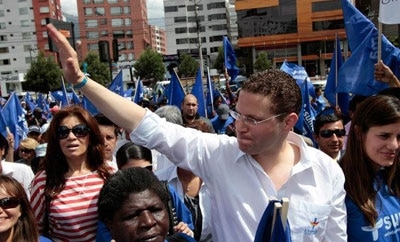A presidential candidate in Ecuador has fallen victim to an express kidnapping, a crime becoming increasingly common across Latin America.
Late at night on February 1, two people jumped into a Quito taxi carrying Mauricio Rodas, the leader of Movimiento Suma (Suma Movement) political party, threw tear gas in his face and took his valuables, reported the Ecuadorean news agency Telam.
The kidnapping lasted about an hour, according to a statement by Rodas’ party, during which the politician was driven to various ATMs and forced to withdraw cash.
After being thrown out of the vehicle on a public highway in south Quito, Rodas was taken to hospital by a pedestrian. The presidential candidate later said the incident was not a political act but an “example of the terrible insecurity suffered by millions of Ecuadorean citizens.”
InSight Crime Analysis
Express kidnapping, where victims are held for just a few hours and typically ordered to empty their bank accounts, is Ecuador’s third most common crime, after robbery and assault. It has become a particular problem in Guayaquil, the country’s second-largest city, with an average of 11 express kidnappings a week during 2012, according to online newspaper Hoy.com. The city’s Citizen Security Observatory has calculated that around $185,000 was stolen during express kidnappings between January and September 2012, an average of $483.50 per incident.
In Quito, express kidnappings increased by more than 60 per cent during 2012, according to a report released earlier this month by global security company Red24. However, this statistic is somewhat misleading as the numbers in the capital are still very low, with only 17 express kidnappings reported between January and August last year, according to the state news agency Andes.
Red24’s report claimed express kidnapping is on the rise across Latin America, with the crime becoming more common in Guatemala, Honduras, Venezuela and Brazil throughout 2012. Mexico was also a “hotspot,” with an estimated 3,000 express kidnappings during the first three quarters of the year. The perpetrators are organized crime groups, the report claimed, with victims typically locals of varying income levels, though tourists are also targeted. It attributed the rise to “economic uncertainty and financial desperation.”
Other public figures to have fallen victim to express kidnappings in Latin America have included the Mexican ambassador to Venezuela.

